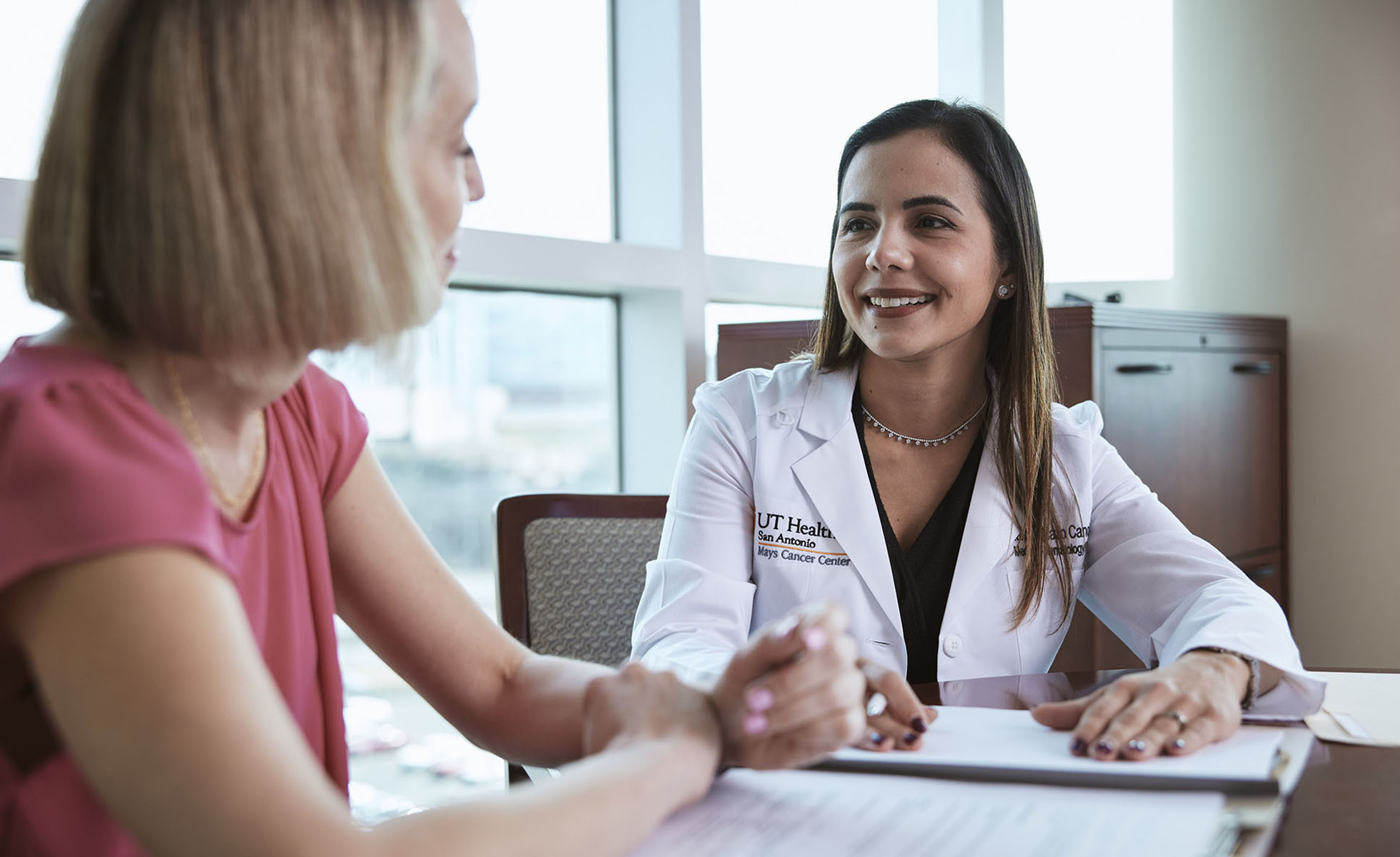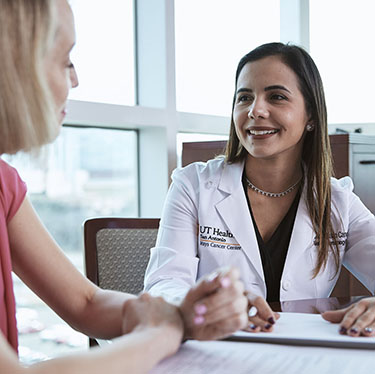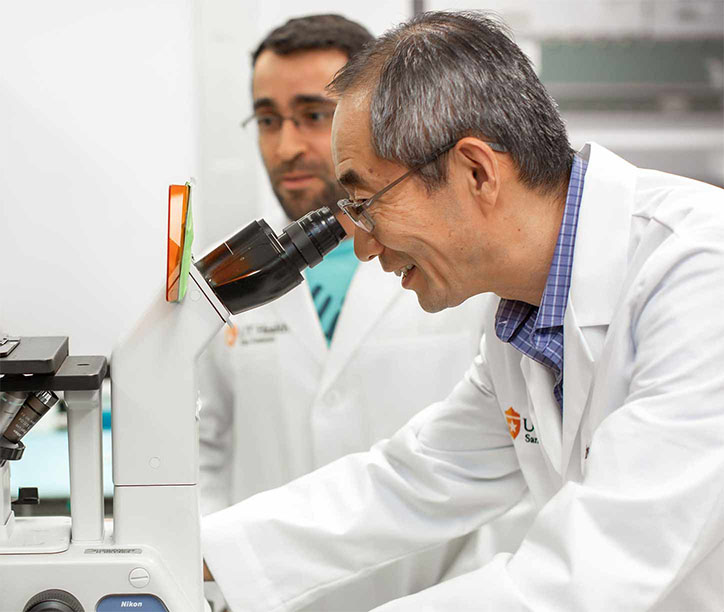

Cancer Genetics Program
- About Us
-
Cancer Care
-
Our Cancer Programs
- Adolescent and Young Adult Cancer Program
- Blood Cancer & Hematological Malignancy Program
- Blood Disorder (Hematology) Program
- Breast Cancer Program
- Cancer Genetics Program
- Cancer Risk Reduction and Education Clinic
- Cardio-Oncology Program
- Childhood Cancer Survivorship Program
- Endocrine Tumor Program
- Eye Cancer Program
- Gastrointestinal (GI) Cancer Program
- Genitourinary Cancer Program
- Gynecologic Oncology Program
- Head and Neck Cancer Program
- Liver Tumor and Cancer Program
- Lung Cancer Program
- Neuro-Oncology (Brain Tumor) Program
- Neurofibromatosis Program
- Pediatric Neuro-Oncology Program
- Pediatric Oncology Program
- Pediatric Sarcoma Program
- Pediatric Thrombosis Program
- Radiation Oncology
- Sarcoma Cancer Program
- Skin Cancer Program
- Supportive Cancer Care Program
-
Screening and Diagnosis
- Cervical Cancer Screening Guidelines
- Colorectal Cancer Screening
- Endometrial (Uterine) Cancer Screening Guidelines
- Hepatitis and Cancer
- HPV Vaccine and Screenings
- Liver Cancer Guidelines
- Lung Cancer Screening
- Mammogram
- Ovarian Cancer Screening Guidelines
- Prostate Cancer Screening Guidelines
- Skin Cancer Screenings
- Sun and Skin Safety
- Tobacco Use and Cancer
- Skin Cancer Screenings
- Cancer Genetics Program
- Cancer Survivorship Program
- Cancer Treatments
- Conditions
-
Our Cancer Programs
- Clinical Trials and Research
- Donate and Volunteer
- Education
- Patients and Families
- Appointments
- Doctors and Locations
-
Community Outreach and Engagement Program
- Message from COE Leadership
- South Texas Cancer Burden and COE Areas of Work
- Our COE Impact
- COE Community Advisory Board
- COE Publications
- Avanzando Caminos (Leading Pathways) Study
- Estudio Avanzando Caminos (Leading Pathways)
- San Antonio Firefighters Cancer Prevention Program
- STAR Immunotherapy Study
A family history of cancer does not mean you will get it. But people with hereditary cancer syndromes (gene mutations that cause cancer) are at the highest risk for developing cancer. These individuals will benefit from meeting with our experts to help understand what they need to do to lower this risk.
Mays Cancer Center, home to UT Health San Antonio MD Anderson Cancer Center, helps you understand your risk. We also offer recommendations to optimize your care. We perform appropriate testing for many types of inherited cancers, including breast cancer, colorectal cancer and prostate cancer.
Why choose us for hereditary cancer screening?
Highlights of our program include:
- Genetic counselors: Many of our genetic counselors have certification from the American Board of Genetics Counselors. These professionals specialize in cancer, which means they deliver focused services that help you make good care decisions. Working with a genetic counselor can help you learn more about whether you might benefit from genetic testing and what the results mean for your health.
- Personalized advice: We test for the hereditary cancer syndromes that are appropriate for your circumstances. We stay current on genetic testing research, so you’ll have access to the latest, most effective techniques. And our years of experience serving San Antonio and 38 counties in South Texas means we understand the unique needs of the people we serve. Learn more about hereditary cancer syndromes.
- Support: We take time to answer your questions before and after testing. Learning about your cancer risk can be overwhelming, and we are here for you with emotional support if needed.
- Cancer prevention and early detection: If you test positive for a hereditary cancer syndrome, we provide recommendations to lower your risk or detect cancer early, when it’s easiest to treat. Options may include more frequent cancer screenings, such as mammograms to catch early signs of breast cancer. We may also recommend preventive therapies, including surgery. Read more about cancer prevention and screenings.
Leading cancer genetic testing in San Antonio
Partnering with MD Anderson Cancer Center brings a higher level of cancer care close to home. We follow many of the same care guidelines MD Anderson uses, including genetic testing methods for specific types of inherited cancer. We also work with laboratories that maintain high quality standards. You can feel confident that you are receiving appropriate services and care.
Get more information about our partnership with MD Anderson.
More information about cancer genetic testing and counseling
Genetic testing may be right for you if you:
- Have two or more family members who developed cancer at an early age or had the same type of cancer
- Have a family history of a hereditary cancer syndrome, including BRCA1- and BRCA2-associated hereditary breast and ovarian cancer syndrome
- Have a personal history of certain types of cancer, including pancreatic cancer
- Are Jewish and of eastern or central European (Ashkenazi) descent
We start by providing basic information about genes and cancer. We also discuss your personal and family health history, including cancer or precancerous conditions. We then review the benefits, risks and limitations of testing so you have a better idea of what to expect.
If you wish to proceed, we analyze a sample of your blood for abnormalities (mutations) that may lead to cancer. We explain what the results may mean for your health. And we let you know whether other members of your family might also benefit from testing.
Many insurance plans cover genetic testing and counseling. Information about your cancer risk remains confidential, meaning that people who are not involved in your care cannot see it. No one can limit or deny future health care services based on genetic testing results.
Research and clinical trials for cancer screening
We are taking extra steps to reduce the burden of cancer on our community. We are exploring the unique ways cancer is affecting people in South Texas, including high rates of liver cancer. We are also developing methods to help more people who are at high risk get appropriate testing.
Find out more about our cancer research and clinical trials.
Care locations
Zeller Building
- Cancer Genetics and High-Risk Screening | 6th Floor
University Hospital
- Pediatric Cancer Genetics and High-Risk Screening Program | Horizon Tower 10th Floor
Get cancer care
Take the first step by visiting our cancer experts for testing, a second opinion or to learn about treatment options.
Request a second opinion
Get the care that is best for you right from the start. Meet with our experts to confirm a diagnosis and review treatment options.
Meet our team
Our team includes cancer experts from different medical specialties who share a commitment to delivering precise, personalized care.

 Close
Close
